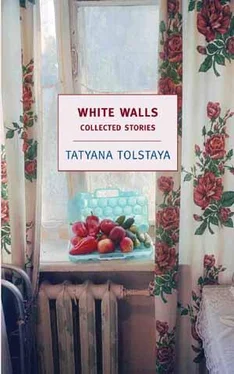“That’s where I live. There’s my window—second from the corner.”
Disembodied heads frown and open their mouths—they’ll eat me—under every window. The heads are horrible, and the damp darkness of the archway is creepy, and Maryvanna is not family. High up, in the window, nose pressed against the dark glass, the hanged uncle waits, running his hands over the glass, peering. Bug off, uncle! You’ll climb out of the Karpovka at night, disguised as an evil Chechen, grin under the moonlight —eyes rolled back into your head—and you’ll run real fast on all fours over the cobblestone street, across the courtyard to the front door, into the heavy, dense dark, with bare hands up the icy steps, along the square staircase spiral, higher, higher, to our door….
Hurry, hurry, home! To Nanny! O Nanny Grusha! Darling! Hurry to you! I’ve forgotten your face. I’ll huddle against your dark skirts, and your warm old hands will warm my frozen, lost, bewildered heart.
Nanny will unwind my scarf, unfasten the button digging into my flesh, and take me into the cavelike warmth of the nursery, where there’s a red night light, where there are soft mountains of beds, and my bitter childish tears will drip into the light blue plate of self-important kasha, so pleased with itself. And seeing that, Nanny will also cry, and sit close, and hug me, and won’t ask but understand with her heart, the way an animal understands an animal, an old person a child, and a wordless creature its fellow.
Lord, the world is so frightening and hostile, the poor homeless, inexperienced soul huddling in the square in the night wind. Who was so cruel, who filled me with love and hate, fear and depression, pity and shame, but didn’t give me words: stole speech, sealed my mouth, put on iron padlocks, and threw away the keys.
Maryvanna, having had her fill of tea and feeling cheerier, drops by the nursery to say good night. Why is this child crying? Come on, come on. What happened? Cut yourself? Stomachache? Punished?
(No, no, that’s not it. Shut up, you don’t understand! It’s just that in the light blue plate, on the bottom the geese and swans are going to catch the running children, and the girl’s hands are chipped off and she can’t cover her head or hold her brother.)
“Come on, wipe those tears, shame on you, you’re a big girl now! Clean up your plate. And I’ll read you a poem.”
Elbowing Maryvanna aside, lifting his top hat and squinting, Uncle Georges comes forward:
Not white tulips
In bridal lace —
It’s the foam of the ocean
On distant shores.
The ship creaks
Its ancient wood.
Unheard of pleasures
Beyond the foam.
Not black tulips —
It’s women in the night.
Noon passions
Are hot at midnight too.
Roll out the barrel!
The native women are fine!
We’ve waited for this night —
Let’s find our pleasure!
Not crimson tulips
Floating on his chest —
The captains camisole
Has three holes in front;
The merry sailors
Grin on the ocean floor…
The women in that country
Had beautiful hair.
“What horrors at bedtime for the child,” grumbles Nanny.
The uncle bows and leaves. Maryvanna shuts the door behind herself: until tomorrow.
Go away all of you, leave me alone, you don’t understand anything.
A prickly ball spins in my chest, and unspoken words bubble on my lips, smeared by tears. The red night light nods. Why, she has a fever, someone far far away cries, but he can’t shout over the noise of wings, geese and swans attacking from the noisy sky.
…The kitchen door is shut. The sun breaks through the matte glass. Noon spills gold onto the parquet floor. Silence. Beyond the door Maryvanna weeps, and complains about us.
“I can’t take any more! What is this—day after day, it gets worse… contrary, spiteful…. I’ve lived a hard life, always among strangers, and I’ve been treated in many ways, of course…. No, the terms—I’m not complaining, the terms are fine, but at my age… and with my health… Where does that spirit of contradiction, that hostility come from…. I wanted a little poetry, loftiness…Useless… I can’t take any more….”
She’s leaving us.
Maryvanna is leaving us. Maryvanna blows her nose into a tiny handkerchief. She powders her red nose, stares deeply into the mirror, hesitates, seems to be seeking something in its inaccessible, sealed universe. And really, deep in its twilight forgotten curtains stir, candle flames flicker, and the pale uncle comes out with a black piece of paper in his hands.
Princess Rose grew weary of life
And ended it at sunset.
She wet her lips sadly
With poisoned wine.
And the prince froze like a statue
In the grim power of sorrow,
And the retinue whispers condolences
That she was innocent.
The porphyry parents
Had their heralds announce
That the grieving populace
Lower flags in the towers.
I enter the funeral procession
As a funereal violin,
I place narcissus on the princess’s
Grave with a melancholy smile.
And pretending sorrow,
I lower my eyes, so that they cannot see:
What a wedding awaits me!
You’ve never seen its like.
The chandeliers are covered with deathly white netting, and the mirrors with black. Maryvanna pulls down her heavy veil, gathers the ruins of her purse with trembling hands, turns and leaves, her worn shoes scuffing over the doorsill, beyond the limit, forever out of our lives.
Spring is still weak, but the snow is gone, and the remaining black crusts lie only in stone corners. It’s warm in the sunshine.
Farewell, Maryvanna!
We’re ready for summer.
Translated by Antonina W. Bouis
When the sun moved into the sign of Scorpio, it grew very windy, dark, and rainy. The wet, streaming city, banging wind against the glass outside the defenseless, uncurtained, bachelor’s window with processed cheeses cooling between the panes on the sill, seemed to be Peter’s evil plan, the revenge of the huge, bug-eyed, big-mouthed, and toothy carpenter-tsar, ship’s axe in his upraised hand, chasing and gaining on his weak and terrified subjects in their nightmares. The rivers, rushing out to the windblown and threatening sea, bucked and with hissing urgency opened the cast-iron hatches and quickly raised their watery backs in museum cellars, licking at the fragile collections that were crumbling into damp sand, at shamans’ masks made of rooster feathers, at crooked foreign swords, at beaded robes, and at the sinewy feet of the angry museum staff brought from their beds in the middle of the night. On days like that, when the rain, darkness, and window-bending wind reflected the white solemn face of loneliness, Simeonov, feeling particularly big-nosed and balding and particularly feeling his years around his face and his cheap socks far below, on the edge of existence, would put on the teakettle, wipe dust with his sleeve from the table, clearing away the books that stuck out their white bookmark tongues, set up the gramophone, selecting the right-sized book to support its listing side, and in blissful anticipation pull out Vera Vasilevna from the torn and yellow-stained jacket—an old and heavy disc, anthracite in color, and not disfigured by smooth concentric circles—one love song on each side.
Читать дальше












